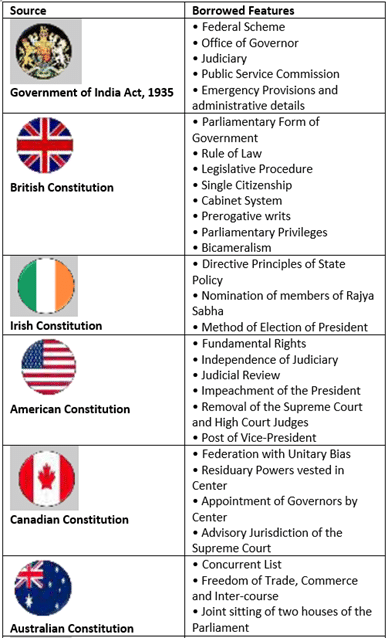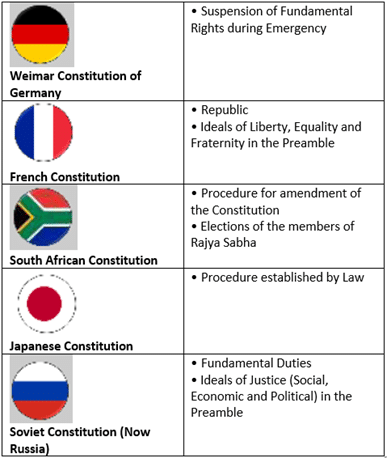UPSC Exam > UPSC Questions > Which of the following provision of the India...
Start Learning for Free
Which of the following provision of the Indian Constitution has been borrowed from the Weimar Constitution of Germany?
- a)Procedure of amendment of the Constitution
- b)Procedure established by law
- c)Ideals of liberty, equality and fraternity in the Preamble
- d)Suspension of Fundamental Rights during emergency
Correct answer is option 'D'. Can you explain this answer?
Verified Answer
Which of the following provision of the Indian Constitution has been b...


Most Upvoted Answer
Which of the following provision of the Indian Constitution has been b...
The correct answer is option 'D' - Suspension of Fundamental Rights during emergency.
Explanation:
The Weimar Constitution of Germany, which was in operation from 1919 to 1933, was one of the key sources of inspiration for the framers of the Indian Constitution. Several provisions of the Indian Constitution were borrowed or adapted from the Weimar Constitution, and one such provision is the suspension of Fundamental Rights during an emergency.
Background on Weimar Constitution:
The Weimar Constitution was adopted in Germany after the end of World War I and the abdication of Kaiser Wilhelm II. It established the democratic Republic of Germany, and aimed to create a stable and democratic government. However, the Weimar Republic faced numerous challenges, including economic crisis, political instability, and the rise of extremists like the Nazis.
Suspension of Fundamental Rights during emergency:
One of the important provisions of the Weimar Constitution was the ability to suspend fundamental rights during a state of emergency. This provision was included to provide the government with necessary powers to deal with extraordinary situations that threatened the stability and security of the state. The Indian Constitution also includes a similar provision.
Article 359 of the Indian Constitution:
In the Indian Constitution, Article 359 empowers the President to suspend the enforcement of Fundamental Rights during a state of emergency. This provision is similar to the one in the Weimar Constitution, and it allows the government to take necessary measures to deal with situations such as war, external aggression, or internal disturbance.
During a state of emergency, the President can issue a proclamation suspending the enforcement of Fundamental Rights. This means that certain rights, such as the right to freedom of speech and expression, right to assemble peacefully, and right to move freely throughout the territory of India, can be suspended temporarily. However, certain rights, such as the right to life and personal liberty, cannot be suspended even during an emergency.
The inclusion of this provision in the Indian Constitution was aimed at ensuring that the government has the necessary powers to tackle extraordinary situations while also safeguarding the fundamental rights of citizens. It reflects the balance between the need for strong governance during emergencies and the protection of individual rights.
In conclusion, the provision of the Indian Constitution that has been borrowed from the Weimar Constitution of Germany is the suspension of Fundamental Rights during an emergency. This provision allows the government to temporarily suspend certain rights in order to deal with extraordinary situations while ensuring the protection of essential rights.
Explanation:
The Weimar Constitution of Germany, which was in operation from 1919 to 1933, was one of the key sources of inspiration for the framers of the Indian Constitution. Several provisions of the Indian Constitution were borrowed or adapted from the Weimar Constitution, and one such provision is the suspension of Fundamental Rights during an emergency.
Background on Weimar Constitution:
The Weimar Constitution was adopted in Germany after the end of World War I and the abdication of Kaiser Wilhelm II. It established the democratic Republic of Germany, and aimed to create a stable and democratic government. However, the Weimar Republic faced numerous challenges, including economic crisis, political instability, and the rise of extremists like the Nazis.
Suspension of Fundamental Rights during emergency:
One of the important provisions of the Weimar Constitution was the ability to suspend fundamental rights during a state of emergency. This provision was included to provide the government with necessary powers to deal with extraordinary situations that threatened the stability and security of the state. The Indian Constitution also includes a similar provision.
Article 359 of the Indian Constitution:
In the Indian Constitution, Article 359 empowers the President to suspend the enforcement of Fundamental Rights during a state of emergency. This provision is similar to the one in the Weimar Constitution, and it allows the government to take necessary measures to deal with situations such as war, external aggression, or internal disturbance.
During a state of emergency, the President can issue a proclamation suspending the enforcement of Fundamental Rights. This means that certain rights, such as the right to freedom of speech and expression, right to assemble peacefully, and right to move freely throughout the territory of India, can be suspended temporarily. However, certain rights, such as the right to life and personal liberty, cannot be suspended even during an emergency.
The inclusion of this provision in the Indian Constitution was aimed at ensuring that the government has the necessary powers to tackle extraordinary situations while also safeguarding the fundamental rights of citizens. It reflects the balance between the need for strong governance during emergencies and the protection of individual rights.
In conclusion, the provision of the Indian Constitution that has been borrowed from the Weimar Constitution of Germany is the suspension of Fundamental Rights during an emergency. This provision allows the government to temporarily suspend certain rights in order to deal with extraordinary situations while ensuring the protection of essential rights.

|
Explore Courses for UPSC exam
|

|
Similar UPSC Doubts
Which of the following provision of the Indian Constitution has been borrowed from the Weimar Constitution of Germany?a)Procedure of amendment of the Constitutionb)Procedure established by lawc)Ideals of liberty, equality and fraternity in the Preambled)Suspension of Fundamental Rights during emergencyCorrect answer is option 'D'. Can you explain this answer?
Question Description
Which of the following provision of the Indian Constitution has been borrowed from the Weimar Constitution of Germany?a)Procedure of amendment of the Constitutionb)Procedure established by lawc)Ideals of liberty, equality and fraternity in the Preambled)Suspension of Fundamental Rights during emergencyCorrect answer is option 'D'. Can you explain this answer? for UPSC 2025 is part of UPSC preparation. The Question and answers have been prepared according to the UPSC exam syllabus. Information about Which of the following provision of the Indian Constitution has been borrowed from the Weimar Constitution of Germany?a)Procedure of amendment of the Constitutionb)Procedure established by lawc)Ideals of liberty, equality and fraternity in the Preambled)Suspension of Fundamental Rights during emergencyCorrect answer is option 'D'. Can you explain this answer? covers all topics & solutions for UPSC 2025 Exam. Find important definitions, questions, meanings, examples, exercises and tests below for Which of the following provision of the Indian Constitution has been borrowed from the Weimar Constitution of Germany?a)Procedure of amendment of the Constitutionb)Procedure established by lawc)Ideals of liberty, equality and fraternity in the Preambled)Suspension of Fundamental Rights during emergencyCorrect answer is option 'D'. Can you explain this answer?.
Which of the following provision of the Indian Constitution has been borrowed from the Weimar Constitution of Germany?a)Procedure of amendment of the Constitutionb)Procedure established by lawc)Ideals of liberty, equality and fraternity in the Preambled)Suspension of Fundamental Rights during emergencyCorrect answer is option 'D'. Can you explain this answer? for UPSC 2025 is part of UPSC preparation. The Question and answers have been prepared according to the UPSC exam syllabus. Information about Which of the following provision of the Indian Constitution has been borrowed from the Weimar Constitution of Germany?a)Procedure of amendment of the Constitutionb)Procedure established by lawc)Ideals of liberty, equality and fraternity in the Preambled)Suspension of Fundamental Rights during emergencyCorrect answer is option 'D'. Can you explain this answer? covers all topics & solutions for UPSC 2025 Exam. Find important definitions, questions, meanings, examples, exercises and tests below for Which of the following provision of the Indian Constitution has been borrowed from the Weimar Constitution of Germany?a)Procedure of amendment of the Constitutionb)Procedure established by lawc)Ideals of liberty, equality and fraternity in the Preambled)Suspension of Fundamental Rights during emergencyCorrect answer is option 'D'. Can you explain this answer?.
Solutions for Which of the following provision of the Indian Constitution has been borrowed from the Weimar Constitution of Germany?a)Procedure of amendment of the Constitutionb)Procedure established by lawc)Ideals of liberty, equality and fraternity in the Preambled)Suspension of Fundamental Rights during emergencyCorrect answer is option 'D'. Can you explain this answer? in English & in Hindi are available as part of our courses for UPSC.
Download more important topics, notes, lectures and mock test series for UPSC Exam by signing up for free.
Here you can find the meaning of Which of the following provision of the Indian Constitution has been borrowed from the Weimar Constitution of Germany?a)Procedure of amendment of the Constitutionb)Procedure established by lawc)Ideals of liberty, equality and fraternity in the Preambled)Suspension of Fundamental Rights during emergencyCorrect answer is option 'D'. Can you explain this answer? defined & explained in the simplest way possible. Besides giving the explanation of
Which of the following provision of the Indian Constitution has been borrowed from the Weimar Constitution of Germany?a)Procedure of amendment of the Constitutionb)Procedure established by lawc)Ideals of liberty, equality and fraternity in the Preambled)Suspension of Fundamental Rights during emergencyCorrect answer is option 'D'. Can you explain this answer?, a detailed solution for Which of the following provision of the Indian Constitution has been borrowed from the Weimar Constitution of Germany?a)Procedure of amendment of the Constitutionb)Procedure established by lawc)Ideals of liberty, equality and fraternity in the Preambled)Suspension of Fundamental Rights during emergencyCorrect answer is option 'D'. Can you explain this answer? has been provided alongside types of Which of the following provision of the Indian Constitution has been borrowed from the Weimar Constitution of Germany?a)Procedure of amendment of the Constitutionb)Procedure established by lawc)Ideals of liberty, equality and fraternity in the Preambled)Suspension of Fundamental Rights during emergencyCorrect answer is option 'D'. Can you explain this answer? theory, EduRev gives you an
ample number of questions to practice Which of the following provision of the Indian Constitution has been borrowed from the Weimar Constitution of Germany?a)Procedure of amendment of the Constitutionb)Procedure established by lawc)Ideals of liberty, equality and fraternity in the Preambled)Suspension of Fundamental Rights during emergencyCorrect answer is option 'D'. Can you explain this answer? tests, examples and also practice UPSC tests.

|
Explore Courses for UPSC exam
|

|
Signup for Free!
Signup to see your scores go up within 7 days! Learn & Practice with 1000+ FREE Notes, Videos & Tests.


























